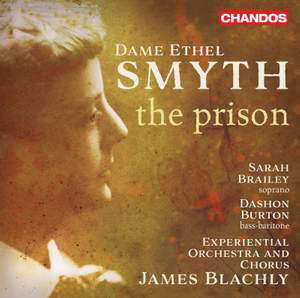The works of Dame Ethel Smyth (1858-1944) are rarely played despite the fact that she was the first woman to have an opera, Der Wald, performed at New York’s Metropolitan Opera in 1903. Her works tended to be overlooked in her native England mostly due to her being seen as a “woman composer”; she was invariably critiqued as being “not as good as” men. If her works were grand and aggressive, she was accused of not being feminine; her more refined works were seen as flimsy.
Best known for many years as a passionate suffragette, she was imprisoned for two months in 1912 for smashing the window of the Secretary of State for the Colonies who had stated that women could vote if they were “as submissive” as his wife. While in prison, she composed a piece known as March of the Women, which, when Thomas Beecham visited, was being sung and marched to “by a dozen ladies”, with Smyth leaning out of her cell window, conducting them with a toothbrush and singing along. Deafness later in life hampered her creativity, if not her spirit.
Her late work, The Prison (1929-30), is uncategorizable. The 64-minute “vocal symphony” for bass-baritone (The Prisoner) and soprano (his Soul), with chorus (philosophical commentary) is in two parts: Close To Freedom and The Deliverance. The heavy-ish text, by Smyth’s dear friend (and perhaps lover, though her relationships tended otherwise to be lesbian) Henry Bennet Brewster centers on the gloomy ruminations of a prisoner considering the end of his life, and his soul, which is guiding him toward peace. In Part 1, He, for instance speaks of his anxiety and inability to sleep, and wonders about immortality and if he will be emancipated; in Part 2, the Soul tells him the end of his struggle is near and he learns to “disband his ego”. The chorus has a further calming effect: immortality is everywhere, human passions remain. He finally finds peace. As you can see, a regular Offenbachian satire–not.
From the very opening moments–“I awoke in the middle of the night”–the mood is weighty with disquiet. The bass-baritone voice of Dashon Burton has both substance and gentleness, his attention to the text that of a Lieder singer. Violin and harp circle his words. Sarah Brailey’s Soul, from the start, sings with subtlety and a type of fleeting loveliness. She opens the second part with a solo on the words “the struggle is over”, intoning much of her words on one note while first a trio of winds, then a solo violin, then the full body of strings and chorus–all pianissimo–join her above and below. Chant? Hymn? Both, really. Smyth layers the orchestra; a brass choir during a passage about immortality makes a grand effect. Later, a painfully beautiful pastoral section precedes the Prisoner’s feeling of metaphysical freedom.
While much of it is gripping, its slow pacing and didacticism can dehumanize the story that the Prisoner and Soul are stuck in. The Prisoner’s “prison”, both metaphorical and real, is presented with such humanity and openness by Burton that his eventual spiritual freedom makes a glorious sound, despite–rather than due to–the orchestrally and chorally weighted underpinnings. Some Elgar shows up, and is not very welcome.
The performance, I suspect, could not be bettered. The New York City-based Experiential Orchestra and Chorus both perform with luscious tone and poise. James Blachly’s leadership brings the work’s lyricism to the forefront; it would be easy to over-emphasize passages but he works best within the dramatic arc of the narrative. Much of The Prison is gorgeous and unexpected–who does Smyth sound like? And while some moments seem inert, they are few and far between.
































